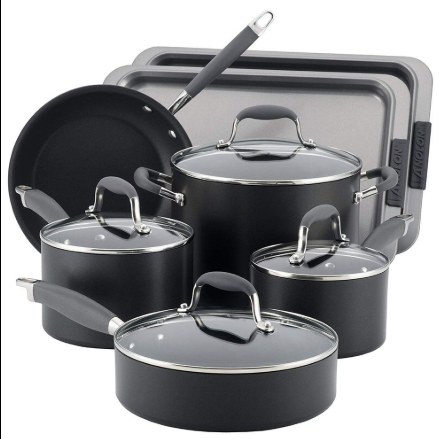Is Hard-Anodized Aluminum Safe for Cookware?

Safety, durability, and performance of a cookware depends largely on the material used in fabricating it. Hard-anodized aluminum is a popular post-processed sheet metal, and from its use of aluminum promises excellent heat distribution and a durable cooking surface.
With increasing concerns about cookware safety, it is unsurprising to wonder when the hard-anodized aluminum cookware is safe for everyday kitchen use? This article will introduce the material, its safety aspects, and how to properly maintain this type of cookware.
What is Hard-Anodized Aluminum?
Hard-anodized aluminum is an aluminum cookware material made using aluminum anodizing type III. This electrochemical process involves submerging an aluminum part in an acid electrolyte bath (most times sulfuric acid).
Passing an electric current through the bath creates an inherent but thick oxide layer that shields the aluminum part and makes it harder than base, type I, and type II aluminum surfaces. Notably, the anodized layer is non-reactive, preventing interaction with acidic or alkaline foods, thus enhancing its suitability for cooking.
Hard-anodized aluminum is a good cookware material because of its excellent thermal conductivity and scratch-resistant surface which makes it more efficient and durable in cooking. However, in terms of safety, especially in direct contact with food, it is important before making it a staple in your kitchen.
Is Hard-Anodized Aluminum Safe for Cookware?
Safety is a crucial concern when choosing cookware, particularly with widespread discussions regarding the health implications of different materials. Fortunately, hard-anodized aluminum is widely considered safe for cooking purposes due to the following reasons:
Non-Toxic Surface
The anodization process locks in the aluminum beneath a hard, non-porous layer, preventing leaching into food. Unlike untreated aluminum, which can react with certain foods, anodized surfaces do not chemically interact with the contents, preserving the integrity and taste of meals.
Heat Resistance
Hard-anodized aluminum cookware is designed to withstand high temperatures, reducing the risk of releasing harmful substances. Hard-anodized surfaces maintain stability, unlike non-stick coatings, which can break down at elevated temperatures.
No Chipping or Peeling
Unlike traditional non-stick coatings, the anodized layer is integrated into the aluminum itself rather than being a separate layer that can chip or peel. This reduces potential health risks and ensures a long-lasting cooking surface.
That said, while hard-anodized aluminum itself is safe, however, the presence of harmful additional layers, like non-stick coatings containing PFOA or PFAS can make it unsafe. Always check the manufacturer’s specifications to ensure the cookware meets safety standards.
How to Maintain Hard-Anodized Aluminum Cookware
Proper maintenance of hard anodized aluminum cookware is crucial to maximize its lifespan and maintain its safety and performance. Here are some guidelines on how to care for your cookware:
Cleaning
Avoid using abrasive cleaners or steel wool that can damage the anodized surface. Instead, opt for a soft sponge or cloth with mild dish soap. If stubborn stains persist, baking soda and water paste is a gentle yet effective cleaner.
Avoiding Dishwasher Use
Although some brands state their hard-anodized cookware is dishwasher safe, it’s advisable to wash them by hand. Dishwashers can be harsh and might lead to discoloration or dulling over time.
Cooking Practices
Use low to medium heat settings to preserve the integrity of the cookware. Hard-anodized aluminum distributes heat efficiently, so excessively high temperatures are generally unnecessary.
Utensil Selection
Use wooden, silicone, or plastic utensils to prevent scratching. Although the anodized surface is rigid, metal utensils can still cause damage over time.
Storage
Ensure that pots and pans are completely dry before storing to prevent watermarks or possible surface damage. Consider using protective sleeves or cloths between stacked items to avoid scratches.
Conclusion
Hard-anodized aluminum cookware provides an appealing blend of durability, performance, and safety, as a result it is a good choice for many kitchens worldwide. It is non-reactive and heat-resistant, further safer because of the reduced tendency to leach substances into food.
When using hard anodized aluminum cookware, you must adhere to recommended maintenance practices, such as handwashing and using appropriate utensils, so you can enjoy its benefits for an extended period.



